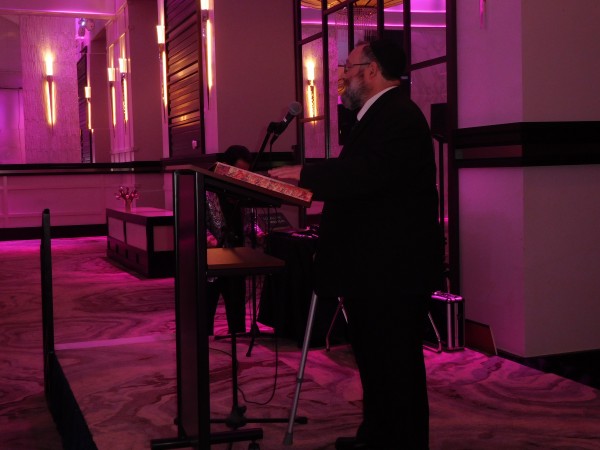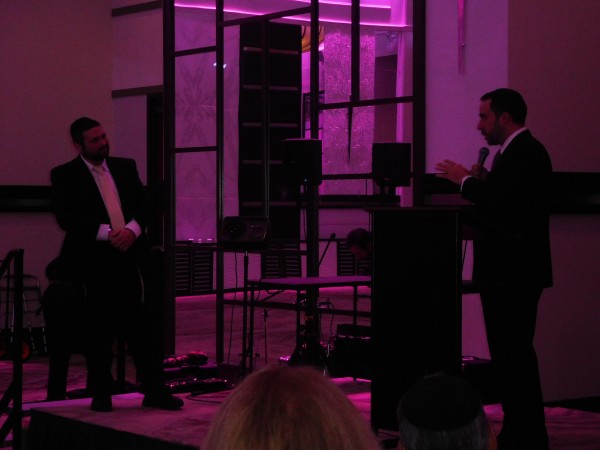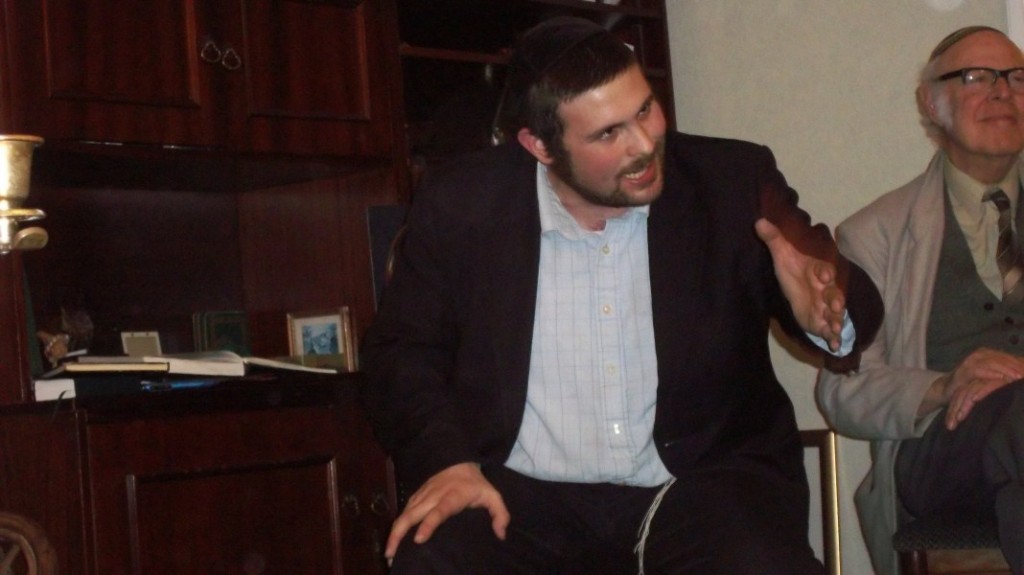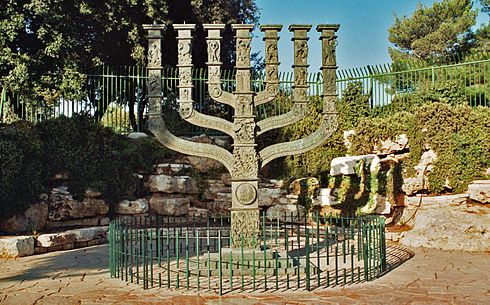Category: Uncategorized
My installation as Rabbi of DOS
https://www.facebook.com/zevi.saunders/videos/10156565521679748/
A discussion on the Vessels of the Mishkan
Parshat Terumah – Was the Mishkan an original plan or a reaction to the sin of the Golden Calf
Source materials
Soforno shemoth 22- 23 א אליך וברכתיך, you do not need to employ artificial means made from silver or gold to attract My benevolent providence, for I can come to you anywhere and bless you when you but mention My name in prayer. soforno terumah 25 5 And so should you make [it]. Hashem’s presence would dwell among them only by means of the Tabernacle. This was a step down from what He had promised them before the sin of the Calf, “In every place that I permit My Name to be mentioned I will come to you and bless you” (20:21). 25:12 Rahi Ki Sisa 33-18 ויתן אל משה וגו׳ AND HE GAVE UNTO MOSES etc. — There is no “earlier” or “later” (no chronological order) in the events related in the Torah: in fact the incident of the golden calf (related in ch. 31) happened a considerable time before the command regarding the work of the Tabernacle was given (ch. 25 and the following chapters). For on the seventeenth of Tammuz were the Tablets broken (when the people were worshipping the calf) and on the Day of Atonement God became reconciled with Israel (after Moses had prayed 80 days for forgivenness; so that it is very unlikely that the command for the building of the Tabernacle should have been given before that day) and on the next day, the eleventh of Tishri (cf. Rashi on Exodus 33:11, at end of comment on ושב אל המחנה), they began to bring their contributions for the Tabernacle which was set up on the first of Nisan. (From the seventeenth of Tammuz until the eleventh of Tishri are almost three months — ימים רבים) (Midrash Tanchuma, Ki Tisa 31). Talmud pessachim 54a The Gemara answers: This is not difficult. This baraita is referring to our fire, and that baraita is referring to the fire of Gehenna. The Gemara explains: Our fire was created at the conclusion of Shabbat, but the fire of Gehenna was created on Shabbat eve. The Gemara proceeds to ask: Was the fire of Gehenna created on Shabbat eve? Wasn’t it taught in a baraita: Seven phenomena were created before the world was created, and they are: Torah, and repentance, and the Garden of Eden, and Gehenna, and the Throne of Glory, and the Temple, and the name of Messiah.
Video shiur Parshas Mishpatim at DOS When were these laws given ? Before or after the 10 commandments ?
10 commandments or statements
| This week we read about the 10 Commandments.They were written on two tablets of stone. The most common explanation is there were 5 on each which obviously made them unbalanced as there are more words on the first set of 5 than the last set. The Midrash records an opinion that all 10 were on both tablets and were visible and readable from both sides. However the word “10 commandments” is a bit of a misnomer. As there are really 613 commandments. As a former teacher of secular kids, I can tell you that everybody knew about the 10 Commandments but not that there were 613 commandments. They were even shocked and aghast that there were more than 10 commandments. In fact the Talmud had exactly the same problem 2000 years ago. The Talmud tells us that the passage of the 10 Commandments was originally inserted into the morning prayers just before the recital of the Shema. However, people began to think that there were only 10 Commandments and didn’t bother learning the rest of them. Therefore they were removed. Some people still have a custom of reciting the 10 Commandments after the conclusion of the daily prayers. The truth is that if one looks ahead a couple of weeks to Parshas Ki Sisa ( ch 34:28) when the Torah describes the moment Moshe descends the mountain with the 2 tablets of stone, it calls them ” עשרת הדברים׳ “ literally 10 words or statements. In the book of Devarim where Moshe is reminiscing about the giving of the Torah, he also only uses the word דברים literally words or statements. The word for commandment in Hebrew is mitzvah and we never find these 10 “commandments” referred to as mitzvot. I therefore believe these are meant to be 10 major statements. These are the most important ideals by which to live. These are the ones deemed so important and special that Hashem gave them directly to us. These are the rules that encompass the entire Torah. Our Rabbis tell us all 613 mizvot/commandments are encompassed in the 10 ‘commandments’. An explanation of how the whole Torah is encompassed in the 10 statements is beyond the scope of this article. |

Yosef and his brothers – whats it all about?
This week’s sedra contains one of the most misunderstood episodes in the Torah. It would appear on face value that 10 of the sons of Yaakov despised their own brother Yosef. They tried to kill him by throwing him into a pit. Eventually, they sold him to a group of merchants travelling to Egypt.
There are numerous questions to be asked on this:
1) How could Jacob show favoritism to one son by giving Yosef a multicolored coat (37:3)? He, having experienced the hatred of his brother, Esov, should have known better.
2) Why was Yosef “fooling around with the children of Bilha and Zilpah” (37:2)?
3) Why did Yosef report all the brothers’ evil plans and actions to Yaakov (ibid)?
4) How could future leaders of the tribes of Israel commit such an act?
The answer I would like to give is based on the sefer “Vayeifk Yossef” written by
Reb Leib Friedman which goes through all the Midrashim and Talmudical sources to deduce the following explanation.
Yosef was a very pious man. We know this from how he managed to spurn the advances of Potifar’s wife when he was a servant at her house in Egypt. . He was able to knock her back even when she clung on to him. Yosef steadfastly kept his Yidiskeit even in lowly Egypt, which was perhaps the most spiritually deprived country at the time steeped in witchcraft and magic. When the Jewish people eventually left on seder night, our Rabbis tell us they were at the 49th and penultimate level of tumah, spiritual impurity.
Yosef is known as “Yosef Hatzadik” Yosef the righteous man. However, he was very humble and tried to hide his good deeds. He did this by goofing around with his brothers and by spending time in the mirror apparently beautifying himself and playing with his hair which gave of the impression he was not spending his time studying Torah. In fact he was studying even as he carried out mundane activities.
However, he was so good at hiding his greatness that even his own family were fooled. They thought he was the”black sheep” of the family. Yaakov thought that just like his father and grandfather had wicked sons, so did he with Yosef. Yosef’s brothers were also concerned with this.
Therefore, they formed a plan. There are two main ways to help children who go off the path and need extra help.
1- Show them extra love, attention and hope this will help turn the child back to the right path.
2- Distance oneself from them, which will shock them into behaving.
Yaakov, being the father, decided to adopt the first approach and show Yosef extra love and attention. He made for him a beautiful multicolored coat made from the finest delicate wool. He gave him extra tuition and taught him all the special parts of Torah he had learned in the Yeshiva of Shem and Ever when he studied there for fourteen years prior to his meeting with Lavan. He hoped he could nurture him into becoming a true tzaddik. This approach works on the premise that one shows how much they care about the other person including his spiritual wellbeing. We show them that we believe the best way of having a good and meaningful life in this world, as well as in the world to come, are by keeping the Torah and being a good Jew. We show them we want them to share in the happiness and reward that awaits us all.
“And the brothers saw that their father loved them more than all his brothers so they hated him and weren’t able to speak nicely to him” (37:4).
Having seen Yaakov adopt the first method and seemingly fail, the brothers adopted the second method of pushing Yosef away. They hoped that by showing him they wanted nothing to do with him, he would change his ways. Perhaps he would be shocked into changing his ways and behaving like a leader of one of the twelve tribes of Israel should.
“And Yosef dreamed a dream and told his brothers” (37: 5). This was like a dagger into the hearts of the brothers. After all Yaakov’s efforts to show Yosef extra love and affection and the brothers efforts to shun and spurn him, Yosef still had visions of grandeur. Their attempts to mould him into a righteous man fitting to be a leader of Israel had seemingly failed.
Therefore, it was time for “plan B”. The brothers now thought that Yosef would turn out like his uncle Esov and great uncle Yishmael both of whom were wicked men until they repented just prior to death. Taking a lead from their grandfather Avrohom who banished Yishmael from his house, the brothers formed a plan to eradicate Yosef.
They voted him liable for the death penalty on account of the licentious gossip he constantly relayed to Yaakov. They reasoned he could cause Yaakov to curse them and ruin their chances of being leaders of Israel. Yosef was therefore a danger to them, and one is allowed to cause harm to another on grounds of self defence.
The Midrash tells us they first tried firing arrows at him from a distance not wanting to harm him with their own hands. When Hashem spared him from the arrows, they set vicious dogs upon him. Finally they elected to kill him with their own bare hands.
Reuven spoke up and saved Yosef’s life by suggesting they give him more time. Maybe a little “alone” time in a pit would do the trick. Hopefully Yosef would be spooked into realizing that he had to wake up and change his ways. This was to be his last warning.
In the end, the brothers sold him to merchants and got rid of him. If he was not going to conform then he had to be driven away as their great-uncle Yishmael was.
The brothers were still fearful of their father, Yaakov, so they made up a story of Yosef being savaged by a beast.
Hopefully, we can now see the brothers in a better light. After all, they all went on to be inscribed on the breast plate worn by the Cohen Gadol.
It also has to be stated that this episode was all the will of Hashem as we see by how the events unfolded. Yosef was to become viceroy of Egypt which would facilitate the Jewish nation ending up in Egypt and their subsequent redemption.
In relation to us here in 5779, there is an important lesson. We must not act hastily when it comes to major chinuch decisions. We have to evaluate each child and see what path works best for him. There is a proverb in Mishlei (22:6) “Educate a child according to HIS own path” No two children are the same. “Just like everyone’s face is different, so are their intellects and character “(Talmud). Sometimes a child needs extra love and affection, but not at the expense of other children.
Children can be scarred for life by their early experiences. Everyone wants to feel loved and appreciated. Every child wants to feel like the most important person in their parents eyes. Let us take the message of this week’s sedra and may Hashem grant us heavenly help in raising and educating our children to be good Jews and upstanding people.
Thanksgiving Jewish Thought
Rabbi Zevi Saunders
Published by Zevi Saunders · 1 hr ·
By the time you read this, the tryptophan from your turkey is probably slowly seeping out of your body. The smell of cooking leftover turkey for Shabbat is slowly wafting through your nose. Perhaps you will be camping out waiting in line for the Black Friday sales, or perhaps sitting on a beach somewhere enjoying your break. Giving thanks is a very Jewish idea. We give thanks every day to hashem for everything we have in our lives. We make a Bracha before we eat or benefit from anything in this world as a way of saying thank you to hashem for providing us with it. We give thanks when we leave the restroom that everything is working well internally. We give thanks when we recover from surgery. In fact every year in the temple times we had to bring the first fruits of the seven species that Israel is praised for, and offer them to the priests in the temple. We would make a declaration thanking hashem going back to the times when Jacob was saved from his father-in-law, Lavan. The RAMBAN( Nachmanides) at the end of parshat BO says the reason we have so many Mitzvot commemorating the exodus from Egypt, is to prompt us to be grateful and thankful for having been saved.
Perhaps we should take this time to think of a few things that we are thankful for in our own lives. We should be thankful for our good health. We should be thankful for our children, grandchildren and all the other things we have in our lives.
I would like to show my thanks to everybody in the Delray community for welcoming me and my wife and family so much and making my family and me feel very special. This is a wonderful community and I’m sure we will grow into the premier location for snowbirds in South Florida.![]()
My response to the Pittsburgh shooting
This weeks events truly put the ‘Mar’
(bitter) into ‘Mar-Cheshvan’
(name of the current Jewish month).
As you’re all aware we are currently
mourning the loss of 11 of our brothers
and sisters in Pittsburgh. This has
shocked the Jewish community to the
core. There is a lot of fear around and
people seem apprehensive about
going to places of worship.
This week we read in the Torah of the
first anti-Semitic attack. When
Abraham’s servant came to find a wife
for Yitzchak he miraculously
found Rebecca. When he met her
parents (according to some sources),
they tried to poison his food and
prevent the Jewish race from
happening. Hashem made a miracle
and an angel came to swap the food
and Rebecca’s father died instead.
From that day on we have faced
serious anti-Semitism from
everywhere. It is nothing new and will
not be totally eradicated until the
arrival of Moshiach. However, leaving
the issues of security for people other
than myself to discuss, we need to
show the haters that we cannot be
beaten. Let’s show that no matter
what, we will still practice our religion.
We will still come to shul. We will still
keep Torah and Mitzvot.
It has just come to light that the nurse
treating the murderer in Pittsburgh was
Jewish and proudly wore a Star of
David. Apparently the perpetrator was
shouting obscenities at her. But this is
what we do as Jews, we are
kind and goodhearted and help
others, and
ultimately righteousness will defeat
hatred.
mg src=”http://www.rabbisaunders.com/wp-content/uploads/2018/11/blog-post-icon-300×180.png” alt=”” width=”300″ height=”180″ class=”alignnone size-medium wp-image-304″ />






